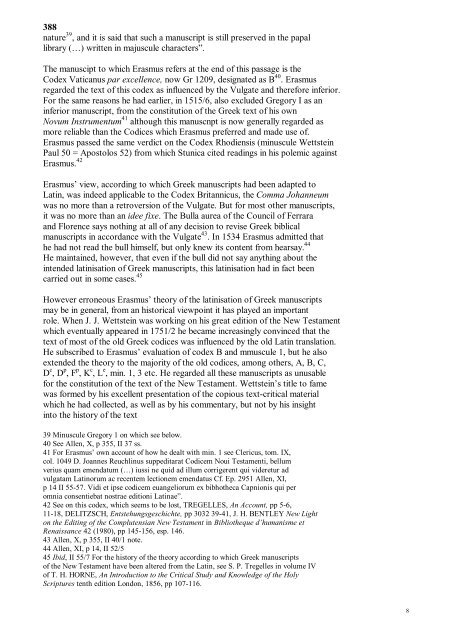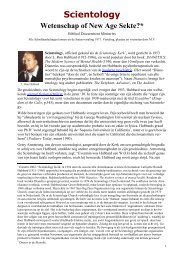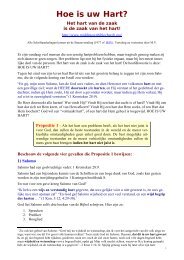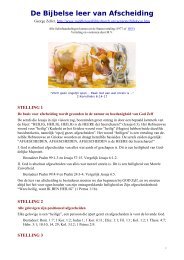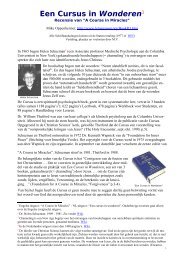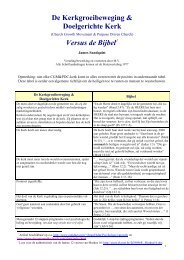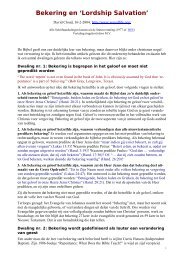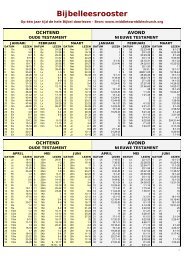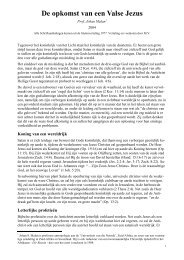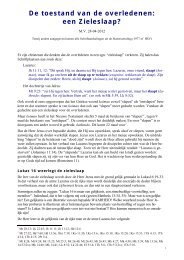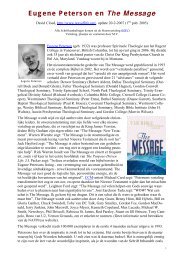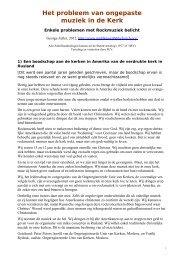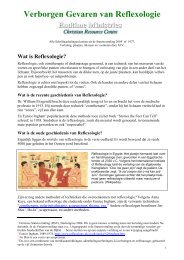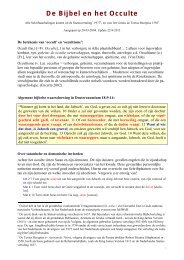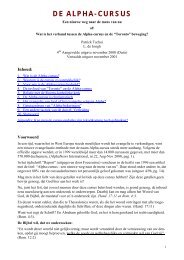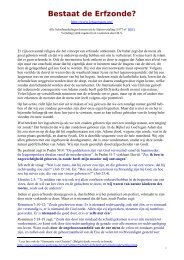erasmus and the comma johanneum - Marc Verhoeven
erasmus and the comma johanneum - Marc Verhoeven
erasmus and the comma johanneum - Marc Verhoeven
Create successful ePaper yourself
Turn your PDF publications into a flip-book with our unique Google optimized e-Paper software.
388<br />
nature 39 , <strong>and</strong> it is said that such a manuscript is still preserved in <strong>the</strong> papal<br />
library (…) written in majuscule characters”.<br />
The manuscipt to which Erasmus refers at <strong>the</strong> end of this passage is <strong>the</strong><br />
Codex Vaticanus par excellence, now Gr 1209, designated as B 40 . Erasmus<br />
regarded <strong>the</strong> text of this codex as influenced by <strong>the</strong> Vulgate <strong>and</strong> <strong>the</strong>refore inferior.<br />
For <strong>the</strong> same reasons he had earlier, in 1515/6, also excluded Gregory I as an<br />
inferior manuscript, from <strong>the</strong> constitution of <strong>the</strong> Greek text of his own<br />
Novum Instrumentum 41 although this manuscnpt is now generally regarded as<br />
more reliable than <strong>the</strong> Codices which Erasmus preferred <strong>and</strong> made use of.<br />
Erasmus passed <strong>the</strong> same verdict on <strong>the</strong> Codex Rhodiensis (minuscule Wettstein<br />
Paul 50 = Apostolos 52) from which Stunica cited readings in his polemic against<br />
Erasmus. 42<br />
Erasmus’ view, according to which Greek manuscripts had been adapted to<br />
Latin, was indeed applicable to <strong>the</strong> Codex Britannicus, <strong>the</strong> Comma Johanneum<br />
was no more than a retroversion of <strong>the</strong> Vulgate. But for most o<strong>the</strong>r manuscripts,<br />
it was no more than an idee fixe. The Bulla aurea of <strong>the</strong> Council of Ferrara<br />
<strong>and</strong> Florence says nothing at all of any decision to revise Greek biblical<br />
manuscripts in accordance with <strong>the</strong> Vulgate 43 . In 1534 Erasmus admitted that<br />
he had not read <strong>the</strong> bull himself, but only knew its content from hearsay. 44<br />
He maintained, however, that even if <strong>the</strong> bull did not say anything about <strong>the</strong><br />
intended latinisation of Greek manuscripts, this latinisation had in fact been<br />
carried out in some cases. 45<br />
However erroneous Erasmus’ <strong>the</strong>ory of <strong>the</strong> latinisation of Greek manuscripts<br />
may be in general, from an historical viewpoint it has played an important<br />
role. When J. J. Wettstein was working on his great edition of <strong>the</strong> New Testament<br />
which eventually appeared in 1751/2 he became increasingly convinced that <strong>the</strong><br />
text of most of <strong>the</strong> old Greek codices was influenced by <strong>the</strong> old Latin translation.<br />
He subscribed to Erasmus’ evaluation of codex B <strong>and</strong> mmuscule 1, but he also<br />
extended <strong>the</strong> <strong>the</strong>ory to <strong>the</strong> majority of <strong>the</strong> old codices, among o<strong>the</strong>rs, A, B, C,<br />
D c , D p , F p , K c , L e , min. 1, 3 etc. He regarded all <strong>the</strong>se manuscripts as unusable<br />
for <strong>the</strong> constitution of <strong>the</strong> text of <strong>the</strong> New Testament. Wettstein’s title to fame<br />
was formed by his excellent presentation of <strong>the</strong> copious text-critical material<br />
which he had collected, as well as by his commentary, but not by his insight<br />
into <strong>the</strong> history of <strong>the</strong> text<br />
39 Minuscule Gregory 1 on which see below.<br />
40 See Allen, X, p 355, II 37 ss.<br />
41 For Erasmus’ own account of how he dealt with min. 1 see Clericus, tom. IX,<br />
col. 1049 D. Joannes Reuchlinus suppeditarat Codicem Noui Testamenti, bellum<br />
verius quam emendatum (…) iussi ne quid ad illum corrigerent qui videretur ad<br />
vulgatam Latinorum ac recentem lectionem emendatus Cf. Ep. 2951 Allen, XI,<br />
p 14 II 55-57. Vidi et ipse codicem euangeliorum ex bibho<strong>the</strong>ca Capnionis qui per<br />
omnia consentiebat nostrae editioni Latinae”.<br />
42 See on this codex, which seems to be lost, TREGELLES, An Account, pp 5-6,<br />
11-18, DELITZSCH, Entstehungsgeschichte, pp 3032 39-41, J. H. BENTLEY New Light<br />
on <strong>the</strong> Editing of <strong>the</strong> Complutensian New Testament in Biblio<strong>the</strong>que d’humanisme et<br />
Renaissance 42 (1980), pp 145-156, esp. 146.<br />
43 Allen, X, p 355, II 40/1 note.<br />
44 Allen, XI, p 14, II 52/5<br />
45 Ibid, II 55/7 For <strong>the</strong> history of <strong>the</strong> <strong>the</strong>ory according to which Greek manuscripts<br />
of <strong>the</strong> New Testament have been altered from <strong>the</strong> Latin, see S. P. Tregelles in volume IV<br />
of T. H. HORNE, An Introduction to <strong>the</strong> Critical Study <strong>and</strong> Knowledge of <strong>the</strong> Holy<br />
Scriptures tenth edition London, 1856, pp 107-116.<br />
8


